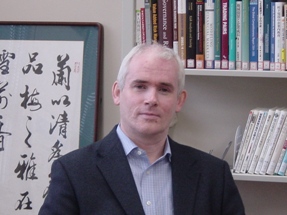Memo #191
By Robert Aspinall – aspinall [at] biwako.shiga-u.ac.jp
 Japan’s prime minister, Shinzo Abe oversaw the revision of the 1947 Fundamental Law of Education to emphasise traditional “Japanese values” in 2006. As one direct result of this, traditional martial arts became compulsory in junior high schools in April 2012. Unlike the initial opposition to the new law, opposition to this particular aspect has not been led by teachers’ unions and their political allies, but by parents concerned about the health and safety of their children.
Japan’s prime minister, Shinzo Abe oversaw the revision of the 1947 Fundamental Law of Education to emphasise traditional “Japanese values” in 2006. As one direct result of this, traditional martial arts became compulsory in junior high schools in April 2012. Unlike the initial opposition to the new law, opposition to this particular aspect has not been led by teachers’ unions and their political allies, but by parents concerned about the health and safety of their children.
In most cases Judo is chosen as the martial art. Many parents are concerned about the very poor safety record of school judo. Between 1983 and 2011, there were 114 recorded deaths and 275 very serious injuries of children in secondary school judo class or club activities. Although some parents of victims have pushed for prosecutions where they believe criminal negligence or other wrong-doing has occurred, public prosecutors have so far refused to act.
With a huge increase in the number of participants since April, it can be assumed that the number of deaths and injuries in Japanese schools will increase. To address great concern over this matter, parents and activists have set up the Japan Judo Accident Victims Association to reduce death and injury in school judo classes.
The discourse over the safety of school judo exemplifies an ongoing conflict between traditional values and liberal values in education. Traditional values stress discipline, obedience to authority, and conformity to the ethos of the group. Liberal pressure groups campaign for children’s rights, more choice, diversity, and respect for the individual in schools.
The picture is made more complicated by the fact that another strand of conservatism is campaigning for the school system to be reformed in order to nurture the entrepreneurs and innovators they believe the stagnant economy requires – reforms that also require more flexibility and choice. Shinzo Abe’s own party – the Liberal Democratic Party – contains politicians of both conservative tendencies. This includes those who want more discipline and obedience, versus the neo-liberals who want more initiative and creative thinking. Only time will tell if the differences between these two groups can be resolved in actual education policy, including policy related to physical education.
About the Author:
Dr. Robert Aspinall is a Professor at Shiga University, Faculty of Economics, Japan and author of the recently published International Education Policy in Japan in an Age of Globalisation and Risk.
Links:
- 108 school judo deaths but no charges, only silence, Japan Times, August 2010.
Related Memos:
- Our other Memos about Japan
